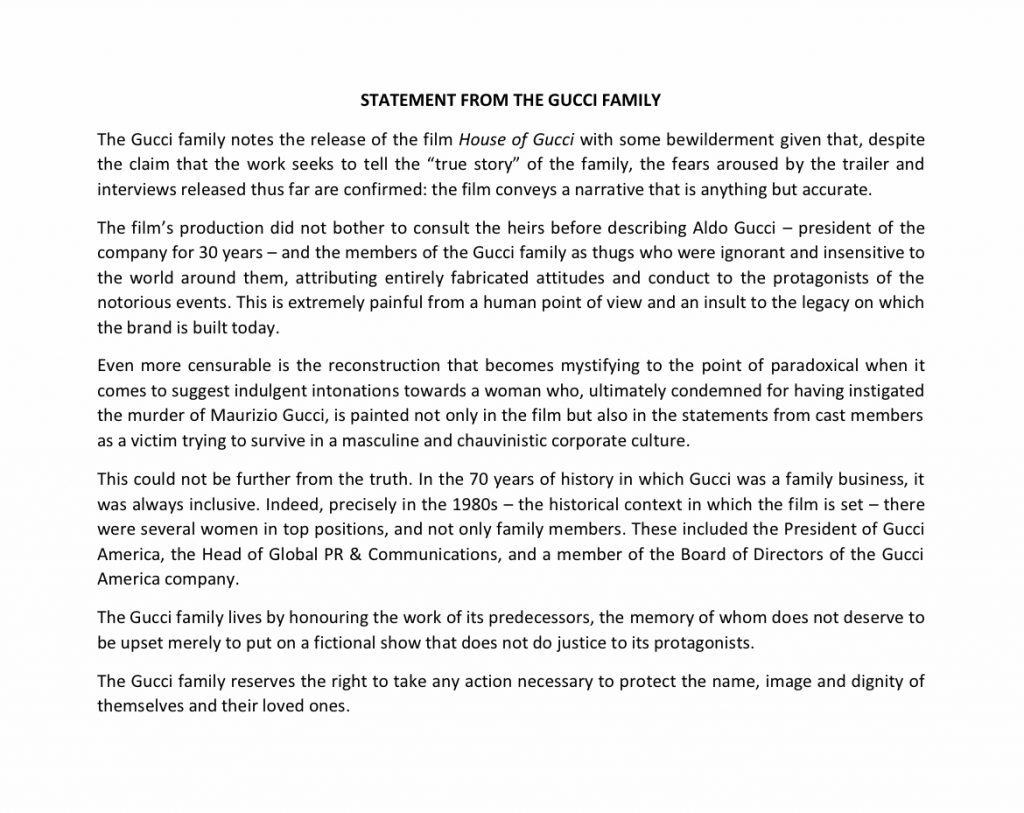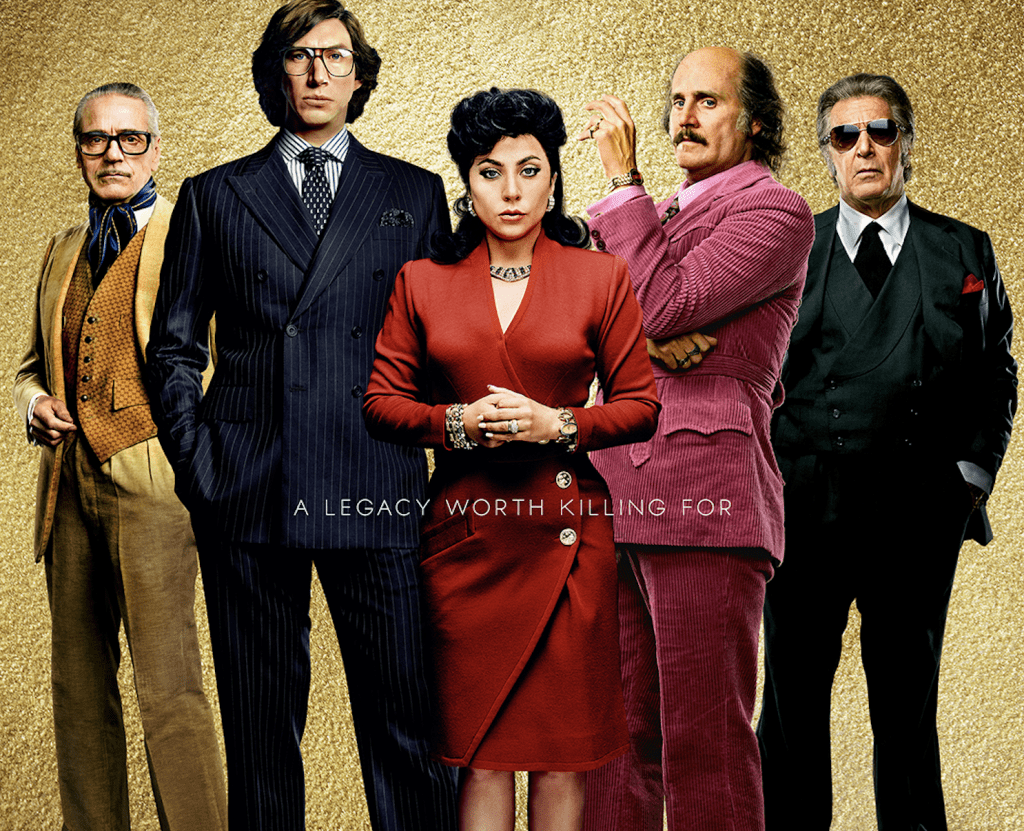Gucci family members hinted at potential litigation in connection with the highly-anticipated release of the House of Gucci this past week. In the wake of the debut of the Ridley Scott-directed film, which stars Lady Gaga, Adam Driver, Jared Leto, and Al Pacino, among others, the heirs of former Gucci chairman Aldo Gucci issued a statement, first published by Italian media, slamming the film – for the second time this year – as “carrying a narrative that is far from accurate” and as portraying “a tone and an attitude to the protagonists of the well-known events that never belonged to them.”
“The production of the film did not bother to consult the heirs before describing Aldo Gucci,” who was the “president of the company for 30 years, and the members of the Gucci family as thugs, ignorant and insensitive to the world around them,” the Gucci family statement said, further asserting that the film – which is largely based on Sara Gay Forden’s 2001 book, The House of Gucci – is “extremely painful from a human point of view and an insult to the legacy on which the brand is built today.”
“Gucci is a family that lives to honor the work of its ancestors, whose memory does not deserve to be disturbed to stage a spectacle that is untrue and which does not do justice to its protagonists,” the statement continued, and ultimately revealed that “the members of the Gucci family reserve the right to take action to protect the name, image and dignity of themselves and their loved ones.”
What Rights Does the Family Have?
As for whether the Gucci family members have legal grounds to proceed on in the U.S., which is where the relevant production and distribution companies for the film and its directors/producers are located, it seems unlikely. Primarily, it is worth noting that while the Gucci family maintains the ability to use their last name in a personal capacity, the majority of the rights in Gucci trademark – for use on everything from apparel and accessories to retail stores services, etc. – are held by Kering. After all, the French luxury goods conglomerate acquired a controlling 42 percent stake of the Gucci Group in 1999 for $3 billion following a long and very public battle with luxury rival for the brand. Later in 2003, Kering raised its stake in the Gucci Group to 67.6 percent, and again in 2004 to 99.4 percent. (For a full look at Kering’s quest for the Gucci Group, you can find that here.)
As the owner of the brand, which is the entity that is actually and consistently using the Gucci trademark in commerce across an array of goods and services, Kering’s rights almost certainly trump those of Gucci family members from a trademark perspective. This is true in the U.S., and in no shortage of other jurisdictions, as well.
With trademark infringement claims almost certainly off the table, Gucci family likely also could not make viable right of publicity-centric claims. As TFL previously reported, while the right of publicity provides individuals with a cause of action in connection with the unauthorized exploitation of their names, likenesses, and recognizable personality traits, that exploitation must take place in a commercial capacity. That would be an issue for any unamused Gucci spawn, as unlike the unauthorized use of their likenesses on a product, for instance, which could give rise to a successful right of publicity action, movies are an expressive medium, and it is well established that “the public interest in preserving such expression outweighs the private interests of individuals in the commercial value of their publicity rights.”
In it unclear if they would have any luck before courts in Italy on right of publicity grounds, as depicted family members Aldo andRodolfo Gucci are dead, and “whether the right of publicity is descendible under Italian law has been the subject of much debate,” according to Lowenstein attorney Matthew Savare. Scholars have expressed mixed views about whether the right of publicity remains in force after an individual’s death, and therefore, becomes an actionable asset for successors. They are traditionally split into three camps: ones that believe that under Italian law, the right dies with the individual at issue; those that view it as surviving a person’s death and then lasts for 50 years; and those that believe that the right extends beyond a person’s death by only if it has been commercially exploited during the individual’s lifetime.
Having said that, the Gucci family may not be entirely without recourse if the film does, in fact, include “inaccuracies” that result of a defamatory portrayal of individual members, as Ms. Gucci says the book does. The use of defamation claims in the context of film is not without existing examples.
Other Film-Prompted Suits
According to Weintraub Tobin attorney Scott Hervey, “There has been a significant number of libel claims that are all based on an unfavorable portrayal of a real person in a work of fiction – television program or motion picture – that is based on real life events.” Although, they have not necessarily been fruitful for the filing parties. Hervey points to the case that Panamanian law firm Mossack Fonseca & Co. and partners Jürgen Mossack and Ramón Fonseca filed against Netflix based on their portrayal in the 2019 Steven Soderbergh-directed, Netflix-released film, “The Laundromat.” The plaintiffs claimed in their October 2019 trademark infringement and libel complaint that Netflix “defames and portrays [them] as ruthless uncaring lawyers who are involved in money laundering, tax evasion, bribery and/or other criminal conduct,” and dilutes the firm’s trademark in the process by using the law firm’s logo in the Panama Papers movie without authorization.
Siding with Netflix in December 2020, a California federal court tossed out the plaintiffs’ libel claims on the basis that “no reasonable viewer of the film would interpret [it] as conveying ‘assertions of objective fact,’ particularly given the statement at the beginning of the Film ‘Based on Actual Secrets’ which sets the stage and the disclaimer at the end of the film that states the film is fictionalized for dramatization and is not intended to reflect any actual person or history.” And even if “a reasonable viewer would view the film as statements of actual fact,” Judge Consuelo Marshall of the U.S. District Court for the Central District of California held that the movie “does not portray Plaintiffs as directly involved in the murders, drug cartels, and other criminal activity committed by their clients as referenced in the complaint.”
Not a total win for Netflix, the court order left the plaintiffs’ trademark dilution and false advertising claims on the table, as they fell outside of the scope of Netflix’s anti-SLAPP motion. (The viability of trademark claims would, of course, not help the Gucci family members, as the Gucci brand is the owner of such rights.)
In a separate but similar suit, Andrew Greene – who was the head of the corporate finance department at Jordan Belfort’s Stratton Oakmont between 1993 and 1996 – filed suit against Paramount Pictures and the producers of the Wolf of Wall Street film in 2014 for allegedly including a character based on him – Nicky Koskoff – and defaming him in the process by having that character engage in “unsavory and illegal behavior.”
Paramount prevailed in the case, with a New York federal court dismissing the $25 million-plus lawsuit on summary judgment. In her December 2018 order, Judge Joanna Seybert of the U.S. District Court of the Eastern District of New York held that “based on the fictionalized nature of the movie; the undisputed facts that the Koskoff character is a composite of three people and has a different name, nickname, employment history, personal history, and criminal history than [Greene]; [and] the movie’s disclaimer,” among other things, Greene “cannot carry his burden of demonstrating actual malice with clear and convincing evidence,” and thus, “his libel claim fails.”
The family v. film-maker feud is not the first of its kind in fashion. The current spat, which as of now is contained to a venue of the media, is not unlike the one that erupted when Tom Rob Smith and Ryan Murphy brought the story of Gianni Versace’s murder to FX. In the case, the fellow Italian fashion family distanced themselves from the small-screen depiction and formally asserted that it had “neither authorized nor had any involvement whatsoever in” the series. And beyond that, the late Pierre Berge took issue with films about partner Yves Saint Laurent, albeit Berge’s protest led to at least one lawsuit.
As for the Black Widow, herself, as Patrizia Reggiani was coined by the Italian media during the trial over her role in a murder-for-hire plot aimed at her ex-husband, Maurizio Gucci, the former member of the fashion and leather goods-famed Gucci family says that she has no plans of filing suit, and that as of now, the family does not either.















